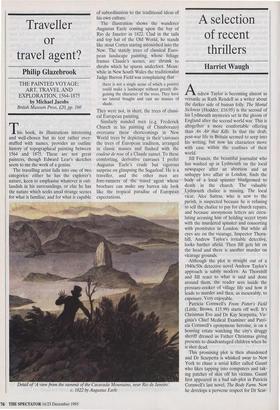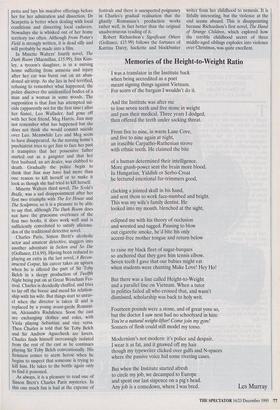A selection of recent thrillers
Harriet Waugh
Andrew Taylor is becoming almost as versatile as Ruth Rendell as a writer about the darker side of human folly. The Mortal Sickness (Hodder, £16.95) is the second of his Lydmouth mysteries set in the gloom of England after the second world war. This is altogether a more comfortable offering than An Air that Kills. In that the drab, post-war life in Britain seemed to seep into his writing, but now his characters move with ease within the confines of their world.
Jill Francis, the beautiful journalist who has washed up in Lydmouth on the local newspaper after an abortion and an unhappy love affair in London, finds the body of a local spinster bludgeoned to death in the church. The valuable Lydmouth chalice is missing. The local vicar, Alec Sutton, who is new to the parish, is suspected because he is refusing to sell the chalice to pay for church repairs, and because anonymous letters are circu- lating accusing him of holding secret trysts with the murdered spinster and consorting with prostitutes in London. But while all eyes are on the vicarage, Inspector Thorn- hill, Andrew Taylor's irritable detective, looks further afield. Then Jill gets hit on the head and there is another murder on vicarage grounds.
Although the plot is straight out of a 1940s/50s detective novel Andrew Taylor's approach is subtly modern. As Thornhill and Jill react to what is said and done around them, the reader sees inside the pressure-cooker of village life and how it leads to murder and then, as inexorably, to exposure. Very enjoyable.
Patricia Cornwell's From Potter's Field (Little, Brown, £15.99) starts off well. It's Christmas Eve and Dr Kay Scarpetta, Vir- ginia's Chief Medical Examiner and Patri- cia Cornwell's eponymous heroine, is on a housing estate watching the city's druggy sheriff dressed as Father Christmas giving presents to disadvantaged children when he is shot dead.
This promising plot is then abandoned and Dr Scarpetta is whisked away to New York to chase a serial killer called Gaunt who likes tapping into computers and tak- ing patches of skin off his victims. Gaunt first appeared in a bad sub-plot in Patricia Cornwell's last novel, The Body Farm. Now he develops a perverse respect for Dr Scar- petta and lays his macabre offerings before her for her admiration and dissection. Dr Scarpetta is better when dealing with local conditions and dissecting local cadavers. Nowadays she is whisked out of her home territory too often. Although From Potter's Field is strongly written, it is dead silly and will probably be made into a film.
In Minette Walters' fourth novel, The Dark Room (Macmillan, £15.99), Jinx Kins- ley, a tycoon's daughter, is in a nursing home suffering from amnesia and injury after her car was burnt out on an aban- doned air-strip. As she lies in bed terrified, refusing to remember what happened, the police discover the unidentified bodies of a man and a woman in some woods. The supposition is that Jinx has attempted sui- cide (apparently not for the first time) after her fiancé, Leo Wallader, had gone off with her best friend, Meg Harris. Jinx may not remember what has happened but she does not think she would commit suicide over Leo. Meanwhile Leo and Meg seem to have disappeared. As the nursing home's psychiatrist tries to get Jinx to face her past it transpires that her possessive father started out as a gangster and that her first husband, an art dealer, was clubbed to death. Gradually the police begin to think that Jinx may have had more than one reason to kill herself or to make it look as though she had tried to kill herself. Minette Walters third novel, The Scold's Bridle, was a sad disappointment after her first two triumphs with The Ice House and The Sculptress, so it is a pleasure to be able to say that, although The Dark Room does not have the gruesome overtones of the first two books, it does work well and is sufficiently convoluted to satisfy aficiona- dos of the traditional detective novel.
Charles Paris, Simon Brett's alcoholic actor and amateur detective, staggers into another adventure in Sicken and So Die (Gollancz, £14.99). Having been reduced to playing an extra in the last novel, A Recon- structed Corpse, his career takes an upturn when he is offered the part of Sir Toby Belch in a sleepy production of Twelfth Night being put on at Great Wencham Fes- tival. Charles is decidedly chuffed, and tries to lay off the booze and mend his relation- ship with his wife. But things start to unrav- el when the director is taken ill and is replaced by a young avant-garde Romani- an, Alexandru Radulescu. Soon the cast are exchanging clothes and roles, with Viola playing Sebastian and vice versa. Then Charles is told that Sir Toby Belch and Sir Andrew Aguecheek are lovers. Charles finds himself increasingly isolated from the rest of the cast as he continues playing Sir Toby Belch conventionally. His firmness comes to seem heroic when he begins to suspect that someone is trying to kill him. He takes to the bottle again only to find it poisoned.
As always, it is a pleasure to read one of Simon Brett's Charles Paris mysteries. In this one much fun is had at the expense of festivals and there is unexpected poignancy in Charles's gradual realisation that the ghastly Romanian's production works rather well, in fact better than the original unadventurous reading of it.
Robert Richardson's Significant Others (Gollancz, £15.99) follows the fortunes of Katrina Darcy, hackette and blockbuster writer from her childhood to nemesis. It is fitfully interesting, but the violence at the end seems absurd. This is disappointing because Richardson's first novel, The Hand of Strange Children, which explored how the terrible childhood secret of three middle-aged siblings explodes into violence over Christmas, was quite excellent.











































































































 Previous page
Previous page